The 2010 Saif Ghobash Banipal Prize for Arabic Literary Translation
Winner Entries
The Winner: Humphrey Davies
 Humphrey Davies
Humphrey Davies
The 2010 Prize for Arabic Literary Translation, the fifth year of the prize, is awarded to:
Humphrey Davies for his translation of the novel Yalo by Elias Khoury, published by Maclehose Press in the UK
Humphrey Davies is also a runner-up this year for his translation of Sunset Oasis by Bahaa Taher, published by Sceptre, UK and recently nominated for the 2011 IMPAC Prize. The Arabic original of Sunset Oasis won the inaugural 2008 International Prize for Arabic Fiction. Both Yaloand Sunset Oasis were long-listed last year for the 2010 Independent Foreign Fiction Prize.
A further runner-up is Kareem James Abu-Zeid for his translation of Cities without Palms by Tarek Etayeb, published by Arabia Books, UK.
The 2010 judges were author Margaret Drabble DBE, writer, translator and Professor of Comparative Literature at Warwick University Susan Bassnett, translator of contemporary Arabic literature of Georgetown University Elliott Colla, and on behalf of the Banipal Trust for Arab Literature Yasir Suleiman, Professor of Modern Arabic Studies and Head of the Department of Middle Eastern Studies at the University of Cambridge.
The Winner Humphrey Davies for his translation of Yalo by Elias Khoury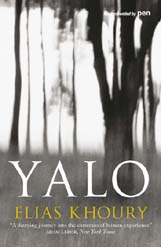 On being told the news, Humphrey declared: “I’m over the moon. To win the Banipal Prize two-and-a half times in five years is indeed a signal honour.”
On being told the news, Humphrey declared: “I’m over the moon. To win the Banipal Prize two-and-a half times in five years is indeed a signal honour.”
Elias Khoury was equally thrilled and told Banipal: “Congratulations to Humphrey. It is great that he has won the prize twice, and both times I have had the honour of accompanying his achievements with my two novels.”
Maclehose Press publisher Christopher MacLehose added: “It will give the author as much pleasure as it does his publisher that Humphrey Davies should have been awarded this distinguished prize for his second successive translation of Elias Khoury's work. The award recognises a remarkable partnership and will give a welcome prominence to the fiction of an exceptional writer as also of his invaluable collaborator.”
What the Judges said
Yasir Suleiman:
"The judges were unanimous in their decision to award the 2010 Saif Ghobash-Banipal Prize for Arabic Literary Translation to Humphrey Davies for his translation of Elias Khoury’s novel Yalo. It was first choice on all the judges’ lists. Yalo is a captivating tale of a young man who is absorbed in his search for who he is. The reader joins Yalo on this journey of violence, sexual abuse, intrigue and fractured lives, moving between slender vignettes of reality and a surrealist world of self exploration tinged with doubt and tantalising uncertainties. Entering the world of Yalo is a revelatory experience in which the reader is kept guessing, asking questions, reaching conclusions and then having them dashed by the many twists and turns in the narrative in a way that almost mirrors Yalo’s self-exploration.
"Elias Khoury is a leading Arab writer whose work has been translated into English and other languages. His narratives are finely textured to create complex characters and nonlinear fictional worlds that are both captivating and intriguing. Crafted out of fragments of memory, Khoury’s narratives typically unfold in simple style that moves slowly before it picks up speed and develop into a galloping pace that carries the reader with.
"This is not the first time a novel by Elias Khoury wins the Saif Ghobash-Banipal Prize for Arabic Literary Translation. Gate of the Sun was the first winner of the Prize in 2006, which was also translated by Humphrey Davies. The judges this year were impressed by the sensitivity of the winning translation and its ability to take the reader into the inner recesses of Yalo’s mind and soul in an intimate way. The simple but exquisitely crafted prose lines create a narrative free of clutter which is sometimes present in translations of Arabic fiction. The authentic voice of the author comes through rather than that of a univocal translator who renders different texts in a near monochrome fashion."
Margaret Drabble:
"This novel is a tour de force for both author and translator, an ambitious work which deals magnificently with the violence of history and the loss and uses of language, with torture and rape and sexuality. An important and complex book, which brings the history of Lebanon vividly, painfully and colourfully to life."
Susan Bassnett:
This is a powerful, moving book that works on many levels. The device of flashbacks and retellings of the protagonist's story is well-handled, and engages the reader's attention from the outset, a task that shows the author's skill, as the narrative becomes increasingly dislocated with the gradual disintegration of Yalo himself. The theme of the book is sombre, but the writing never deteriorates into sensationalism or prurience; rather Elias Khoury manages the difficult task of maintaining a kind of sympathy for Yalo, the alter ego of one Daniel Abyad, as we learn of his disfunctional family, the tragic mistakes of his life, his doomed relationships and his criminal tendencies. The translation is fluent and the language well-crafted. Once I started reading this book, I found it compulsive and it went straight to the top of my list of winners.
Elliott Colla:
"With Yalo, Elias Khoury once again confirms his pre-eminent reputation among contemporary Arab writers. This is not merely a novel – it is a politically charged and philosophically nuanced interrogation of what literature can and cannot do with regard to histories of violence, and the answers it renders are disturbing.
"Humphrey Davies’s seamless translation hides the skill with which he works here. The language of this novel is notoriously difficult. Davies renders this difficulty in a fluent British idiom, but never at the expense of the complexities of the original.
"Yalo explores the violent, open-ended legacy of the Lebanese Civil War, rooting it in a much longer modern history of dispossessions and injuries. In doing so, the novel shows how, unresolved, the weight of this history fuels not just more violence, but also the very desires and dreams of all, both those who participate in war and those who merely stand in its wake. Yalo dismantles neat divisions between perpetrator and victim by submitting both terms to close literary reflection. By the time the title character’s stories are done, Khoury has managed to show that writing – whether of history or fiction – is not up to the task of exculpating, let alone redeeming, the crimes described in its narratives."
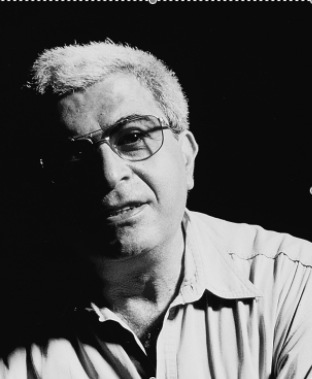 Elias Khoury
Elias Khoury
In the fifth year of the prize, by coincidence, the names of both the winning translator and the author are the same as those of the first year – Humphrey Davies won the inaugural 2006 prize for his translation of Elias Khoury’s Gate of the Sun (published 2005). In 2000 Humphrey Davies published his first literary translation in Banipal magazine, a short story in Egyptian colloquial, “Rat”, by Sayed Ragab. Then cameThebes at War by Naguib Mahfouz (2003), Alaa Aswany’s best-selling The Yacoubian Building (2004) and his short stories Friendly Fire (2009), Ahmed Alaidy’s Being Abbas el Abd (2006), Gamal al-Ghitani’s Pyramid Texts and Hamdy el-Gazzar’s Black Magic (both 2007), Mohamed Mustagab’s Tales of Dayrut (2008) and Khaled al-Berry’s Life Is More Beautiful Than Paradise (2009), all originally for the pioneering AUC press. He has also edited and translated the Ottoman-era work Brains Confounded by the Ode of Abu Shaduf Expounded by Yusuf al-Shirbini (Leuven: Peeters, 2004 and 2007). Bahaa Taher’s novel Sunset Oasis won the International Prize for Arabic Fiction’s first prize in 2007 and Humphrey Davies was chosen as translator. This year Maclehose Press will publish another novel by the Khoury-Davies team, As Though She Were Sleeping(due May 2011). Also forthcoming translated by Humphrey Davies is the sequel to Mourid Barghouti’s I Saw Ramallah (Bloomsbury 2011), and Naguib Mahfouz’s Midaqq Alley (AUCP 2011).
For more information about Yalo from the publisher's website, click here . . . and for the hardback edition here.
To buy a copy in the UK – hardback, paper or kindle, click here
US readers who want to read Humphrey Davies's translation of Yalo will probably have to buy it from outside the USA since the US edition, published by Archipelago Press, is translated by Peter Theroux. This edition was shortlisted for the 2009 US Best Translated Book Award.
Banipal 40 – LIterature from Libya wiil include reviews of two novels by Elias Khoury in English translation – Yalo and White Masks. Click here for Banipal magazine's home page to join the email listing and receive news of Banipal 40's publication in March.
Have you read Yalo? Would you like to post your views on the site? Or have you already reviewed it online? Tell us your views, by email in the first instance, and send us links by clicking here.
* * *
Two Runners-up
Runner-up:
Humphrey Davies for his translation of Sunset Oasis by Bahaa Taher
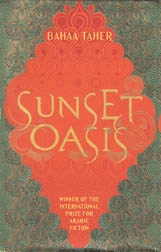
What the Judges said
Yasir Suleiman:
"The judges had the good fortune of comparing the translation of Yalo with Bahaa Taher’s Sunset Oasis, also translated by Humphrey Davies, which was chosen by the judges as one of two runners-up in 2010. The two translations could not be more different. They spoke in different voices that reflected the distinctiveness of their Arab authors. This is a tribute to the virtuosity of Humphrey Davies as one of the best translators of Arabic fiction into English.
"Sunset Oasis was the winner of the International Prize of Arabic Fiction (IPAF) in 2009. The novel provides a powerful narrative of Egyptian society at a crucial point in its modern history. Its clean and powerful narrative lines and the full grasp of the historical background against which the events of the novel unfold create a gripping story of love, intrigue, social unrest and tragedy."
Margaret Drabble:
"This is a profound, subtle and resonant novel by one of the Arab world’s greatest writers. It interweaves the colonial histories of east and west, moves effortlessly between historical periods, and creates, in the oasis, a memorable and elegiac image of the ruins of time. It is sensitively translated, and the English reader can sense the poetry of the original."
Susan Bassnett:
"A gripping many-stranded narrative that engages with memory, history, politics and love. I read it in a single sitting, as the fast pace and carefully constructed plot lines held my attention and compelled me to keep on turning the pages. The translation is strong, though with occasional lapses into a more banal language, which kept it from being in first place for me."
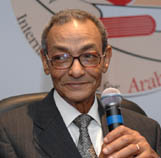
To read a review of Sunset Oasis in Banipal 36, click here
To buy a copy in the UK, click here
Have you read Sunset Oasis? Would you like to post your views on the site? Tell us your views, by email in the first instance, by clicking here.  To buy a copy in the US,
To buy a copy in the US,
published by McClelland & Stewart,
click here for the publisher's website
and here for Amazon.com
Runner-up:
Kareem James Abu-Zeid for his translation of Cities without Palms by Tarek Etayeb
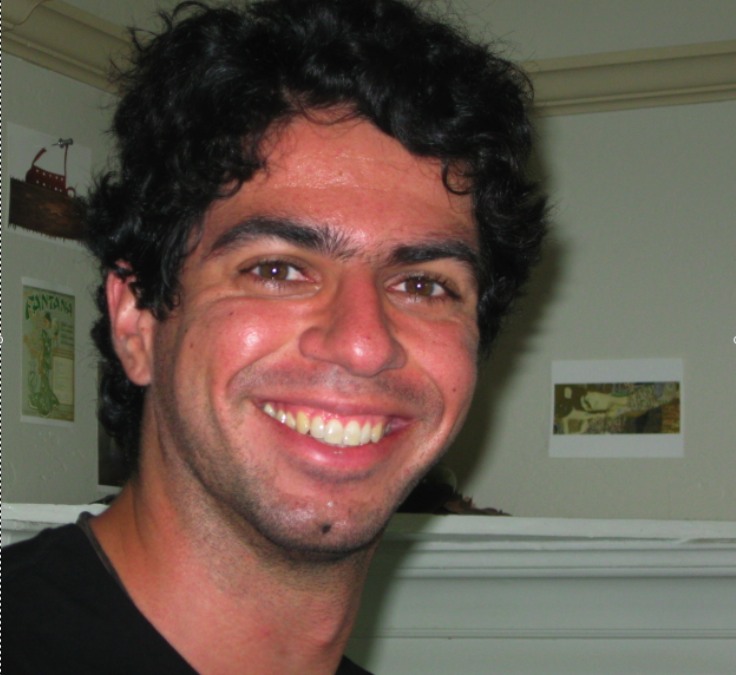
On being told the result, Kareem James Abu-Zeid said:
“It’s a real honor for me to be selected as one of the runners up, especially since this was the first novel that I have translated.”
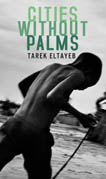
What the Judges said
Yasir Suleiman:
"The other runner-up is Cities without Palms by the Sudanese writer Tarek Eltayeb, translated by Kareem James Abu-Zeid. This slender but moving novel is reminiscent of Tayeb Salih’s well-known classic Season of Migration to the North, though in no way is it a parody or copy. Migration and its traumas, the passage into adulthood and the cruel hand of fate combine together to create a haunting tale of great sympathy that once started is hard to put down until the end."
Margaret Drabble:
"This is the deceptively simple but emblematic tale of a village boy from the Sudan who travels to the cities of the north and the west and then home again. It rings true on every page, and the contrasts of rural and city life are tellingly described. This is a story of our time, told with insight and sympathy, in a simple prose that the translator renders skilfully and unobtrusively into everyday English."
Susan Bassnett:
"A moving short novel by a new writer, which recounts the journey of a young Sudanese man who leaves his village for Cairo, then travels to Europe in search of a better life. Told in the first person, the novel has a minimalist quality, and I felt that it would make a strong one-man stage piece, as the quality of story telling is so good. Though the novel takes us through stages of disappointment as hopes are crushed, the bleakness of the ending still came as a stark and chilling coup, and left me very moved. This is a novel that should surely serve to raise awareness of the tragic journeys that so many young people embark on all over the world every day in this globalised world of savage inequalities. The translation reads fluently, the plainness of the writing reflecting the simplicity of the central character."
* * *
Kareem Abu-Zeid has translated works by poets from Sudan, Syria, Lebanon, Palestine and Iraq and is currently translating Eltayeb’s sequel to Cities Without Palms, The Palm House (AUC Press 2011) as well as The Far-Off Call (AUC Press 2012) by Libyan novelist Ibrahim al-Koni.
Born into an Egyptian American family, Kareem Abu-Zeid has lived an itinerant life around the Middle East, the US, and Europe. He received his BA from Princeton University in 2003 in French and German Literature, and was a Fulbright Research Fellow in Germany as well as a CASA Fellow at the American University in Cairo. He has taught language, literature and philosophy courses in Arabic, French, German, and English at UC Berkeley, the University of Heidelberg, and the University of Mannheim, and is currently doing a PhD on the intersections of modern Arabic poetry, mysticism and continental philosophy at UC Berkeley’s department of comparative literature. He lives in Oakland, CA.

Tarek Eltayeb
Click here for more information about Cities without Palms on the publisher’s website and to buy a copy from their online shop with free post and packing.
To buy a copy in the US, click here
Cities Without Palms was reviewed in Banipal 35's BOOKS IN BRIEF.
To read the review in The Complete Review, click here
Have you read Cities without Palms? Would you like to post your views on the site? Tell us your views, by email in the first instance, by clicking here.

